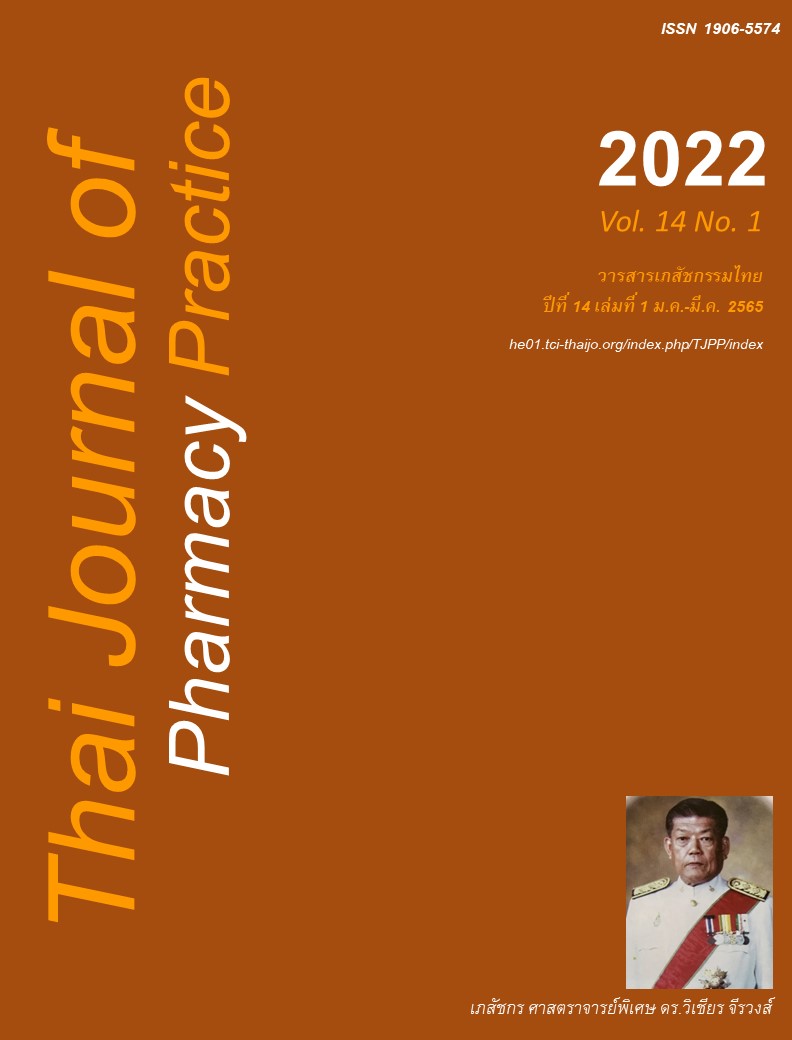ความคาดหวังของทีมสหวิชาชีพต่อบทบาทของเภสัชกรในการดูแลผู้ป่วยระยะท้ายแบบประคับประคอง
Main Article Content
บทคัดย่อ
วัตถุประสงค์: เพื่อศึกษาความคาดหวังของทีมสหวิชาชีพที่ดูแลผู้ป่วยระยะท้ายแบบประคับประคองต่อบทบาทของเภสัชกรในการดูแลผู้ป่วยกลุ่มนี้ วิธีการ: การศึกษาส่วนที่ 1 เป็นการอภิปรายกลุ่มของทีมสหวิชาชีพที่ดูแลผู้ป่วยระยะท้ายแบบประคับประคองจำนวน 3 คนได้แก่แพทย์ พยาบาล และเภสัชกร การสรุปข้อมูลใช้การวิเคราะห์เนื้อหา ส่วนที่ 2 เป็นการศึกษาเชิงสำรวจ โดยส่งแบบสอบถามความคิดเห็นของ แพทย์ พยาบาล เภสัชกรที่ดูแลผู้ป่วยระยะท้ายแบบประคับประคองในโรงพยาบาลระดับปฐมภูมิและทุติยภูมิในเขต 7 ทุกโรงพยาบาล ผลการวิจัย: ทีมสหวิชาชีพมีความเห็นว่า เภสัชกรมีความสำคัญต่อทีม โดยทำหน้าที่ประเมินการใช้ยา จัดเตรียมยาให้เพียงพอ ให้ความรู้และข้อมูลด้านยา โดยเฉพาะกลุ่ม opioids แก่ แพทย์ พยาบาล ผู้ป่วย และญาติ การศึกษาส่งแบบสอบถามจำนวน 222 ฉบับ และได้รับการตอบกลับจำนวน 143 ฉบับ (ร้อยละ 64.41) แพทย์ พยาบาล และเภสัชกรนิยามการดูแลผู้ป่วยระยะท้ายแบบประคับประคองว่า หมายถึง การดูแลผู้ป่วยแบบองค์รวมในมิติด้านร่างกาย จิตใจ สังคมและจิตวิญญาณ โดยยึดผู้ป่วยเป็นศูนย์กลาง แพทย์และพยาบาลต้องการให้เภสัชกรเป็นที่ปรึกษาด้านยาในเวลาที่ทีมต้องการ ส่วนเภสัชกรต้องการมีส่วนร่วมในทีมตั้งแต่การวางแผนงานและเป็นที่ปรึกษาด้านยาเวลาที่ทีมต้องการ ทุกวิชาชีพเห็นว่า จุดเด่นของเภสัชกรคือ มีความรู้ความเชี่ยวชาญด้านการค้นหาและแก้ไขปัญหาด้านยา โดยเฉพาะยาแก้ปวดกลุ่ม opioids จุดอ่อนของเภสัชกรในมุมมองของแพทย์และพยาบาล คือ ประสบการณ์การดูแลผู้ป่วยระยะท้ายอย่างใกล้ชิดค่อนข้างน้อย ไม่ค่อยเข้าใจปัญหาผู้ป่วยอย่างรอบด้าน หากเภสัชกรมีความรู้ด้านธรรมะจะช่วยให้เข้าใจจิตใจผู้ป่วยดีขึ้น เภสัชกรมองว่า ตนเองมีภาระงานมากจึงไม่สามารถทำงานกับทีมได้เต็มที่ สรุป: เภสัชกรมีความสำคัญและจำเป็นต้องมีในทีมดูแลผู้ป่วยระยะท้ายเพื่อดูแลด้านยา การเพิ่มเติมความรู้ธรรมะจะช่วยให้เข้าใจผู้ป่วยและดูแลผู้ป่วยได้ดีขึ้น
Article Details
ผลการวิจัยและความคิดเห็นที่ปรากฏในบทความถือเป็นความคิดเห็นและอยู่ในความรับผิดชอบของผู้นิพนธ์ มิใช่ความเห็นหรือความรับผิดชอบของกองบรรณาธิการ หรือคณะเภสัชศาสตร์ มหาวิทยาลัยสงขลานครินทร์ ทั้งนี้ไม่รวมความผิดพลาดอันเกิดจากการพิมพ์ บทความที่ได้รับการเผยแพร่โดยวารสารเภสัชกรรมไทยถือเป็นสิทธิ์ของวารสารฯ
เอกสารอ้างอิง
Pairojkul S. Criteria of palliative care. Khon Kaen: Faculty of Medicine, Khon Kaen University; 2010.
Ziegler LE, Craigs CL, West RM, Carder P, Hurlow A, Millares-Martin P, et al. Is palliative care support associated with better quality end-of-life care indicators for patients with advanced cancer? a retrospective cohort study. BMJ Open 2018; 8: 1–9.
Asia Pacific Hospice Palliative Care Network. Background to palliative care [online]. 2016 [cited Mar 2, 2020]. Available from: aphn.org/background-to-palliative/
Harding M. Palliative care [online]. 2016 [cited Mar 2, 2020]. Available from: patient.info/doctor/palliative-care
Wasi P. Hall of fame speech of sumalee nimmannit: Palliative care and humanized medicine. Bangkok: Printozone; 2009.
Department of Medical Services. Palliative care guideline [online]. 2014 [cited Mar 2, 2020]. Available from: www.dms.moph.go.th/dmsweb/cpg corner/Palliative Care Guideline.pdf
Ashnor M, Pugh J, Jiwa M, Hughes J, Fisher C. The palliative care interdisciplinary team: where is the community pharmacist? J Palliat Med 2011;14:7–11.
American Society of Health-System Pharmacists. ASHP guidelines on the pharmacist’s role in palliative and hospice care [online]. 2016 [cited May 8, 2020]. 2016; Available from: www.ashp.org/-/media/assets/policy-guidelines/docs/guidelines-pharmacists-roles-palliative-hospice-care.ashx?la=en
O’Connor M, Hewitt LY, Tuffin PHR. Community pharmacists’ attitudes toward palliative care: An Australian nationwide survey. J Palliat Med. 2013; 16: 1575–81.
Ma JD, Tran V, Chan C, Mitchell WM, Atayee RS. Retrospective analysis of pharmacist interventions in an ambulatory palliative care practice. J Oncol Pharm Pract 2016; 22: 757–65.
Discala SL, Onofrio S, Miller M, Nazario M, Silverman M. Integration of a clinical pharmacist into an interdisciplinary palliative care outpatient clinic. Am J Hosp Palliat Med 2017; 34: 814–9.
Yamada M, Matsumura C, Jimaru Y, Ueno R, Takahashi K, Yano Y. Effect of continuous pharmacist interventions on pain control and side effect management in outpatients with cancer receiving opioid treatments. Biol Pharm Bull 2018; 41: 858–63.
Kradanpol S, Poompruek P. Perspective of pharmacist’s abilities in palliative care according to multidisciplinary team’s expectation. Journal of Health Systems Research. 2017; 11: 91–101.
Thai Ministry of Public Health. Guidelines for drug administration in palliative care. Nonthaburi: Office of the Permanent Secretary, Ministry of Public Health; 2018.
Wannathong P. Development of medication management system in patients with palliative care. Bangkok: The Healthcare Accreditation Institute; 2019.
Gazala A, Corcoran E, MacRobbie A, Harrington G, Bennie M. Developing a model for pharmaceutical palliative care in rural areas—Experience from Scotland. Pharmacy (Basel) 2017; 5: 6. doi: 10.339 0/pharmacy5010006.


